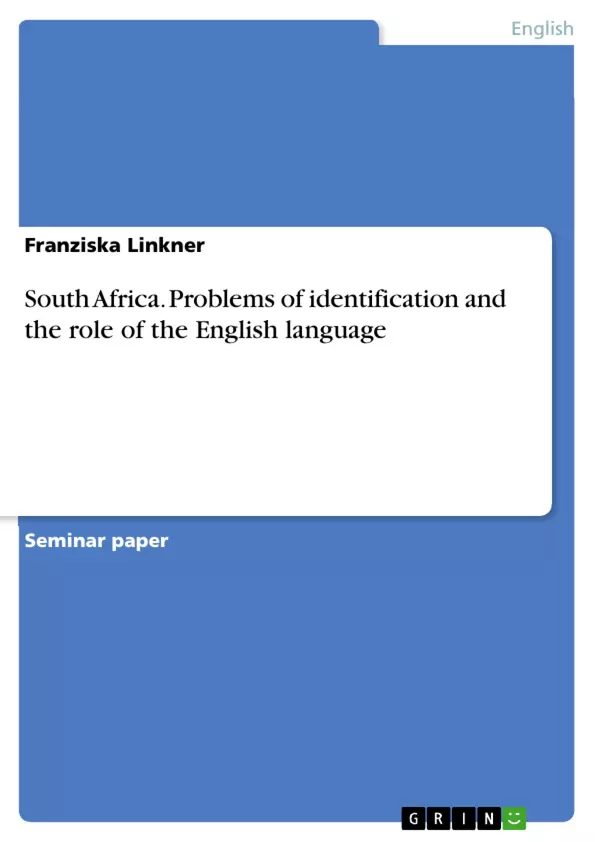The aim of this work is to give an overview of the English language in South Africa. There will be a description of how the English language reached South Africa, which other languages were and are there and what problems exist between those languages and probably between their ethnical groups too.
Furthermore the status of English in South Africa will be discussed. Who uses English? Is it used by specific social classes? In which fields of society can English be found? Is it more a mother tongue than a second language or the other way around?
This work will end with a conclusion and an answer to the question if there are real identity problems and in which way the citizens try to handle the situation.
Inhaltsverzeichnis (Table of Contents)
- Introduction: Aims of this work
- English in South Africa
- Overview: the English language in South Africa
- History of the English language in South Africa
- Sociallinguistic background: Problems of identification
- What is identity?
- Language identity in a multilingual context
- Language Identity, Identity due to language
- The problem of identification in South Africa
- The status of English in South Africa today
- English as a mother tongue and as a second language
- The spread of English
- Conclusion
Zielsetzung und Themenschwerpunkte (Objectives and Key Themes)
The main goal of this work is to provide a comprehensive overview of the English language in South Africa. It aims to explore the history of English in the region, the linguistic landscape, and the complexities of identity formation in a multilingual context.
- The historical development of English in South Africa
- The status and role of English in a multilingual society
- The challenges of identity formation in a multilingual context
- The impact of English on different social groups and spheres of life
- The relationship between language and identity in South Africa
Zusammenfassung der Kapitel (Chapter Summaries)
- The introduction outlines the objectives and scope of the work, focusing on the presence and role of English in South Africa. It aims to explore the language's historical development, its current status, and its impact on identity formation.
- This chapter delves into the arrival of English in South Africa, tracing its historical roots and explaining its development in the region. It examines the influence of the English language on the existing Dutch settlements and its subsequent spread to other areas.
- This section explores the concept of identity in a multilingual context, examining the relationship between language and identity. It explores the complexities of identity formation in South Africa, where a multitude of languages and cultures co-exist.
- The chapter focuses on the challenges of identity formation in South Africa, analyzing the problems of identification that arise in a multilingual society. It examines the impact of English on various social groups and its role in the formation of identities.
- This chapter discusses the current status of English in South Africa, examining its role as both a mother tongue and a second language. It explores the widespread use of English in various sectors of society and its impact on communication and cultural exchange.
Schlüsselwörter (Keywords)
This work focuses on the English language in South Africa, exploring its historical development, linguistic landscape, and impact on identity formation. Key concepts include multilingualism, language policy, identity construction, linguistic variation, and the role of English in a multilingual context.
Frequently Asked Questions
How did the English language reach South Africa?
English arrived in South Africa through British colonial expansion, starting with the occupation of the Cape in 1795 and subsequent waves of British settlers in the 19th century.
Is English the most spoken mother tongue in South Africa?
No, while English is the dominant language in government, media, and business, it is spoken as a mother tongue by only a minority. However, it is the most common second language across various ethnic groups.
What is the relationship between language and identity in South Africa?
In a multilingual society, language is a core part of ethnic and cultural identity. Many South Africans face "identity problems" as they navigate between their indigenous mother tongues and the global status of English.
Why is English often preferred in South African public life?
English is often seen as a "neutral" lingua franca that bridges the gap between different ethnic groups (like Zulu, Xhosa, and Afrikaans speakers) and provides access to international education and markets.
What are the social implications of speaking English in South Africa?
Fluency in English is frequently associated with higher social status and better job opportunities, which can create social divisions between those with access to high-quality English education and those without.
- Arbeit zitieren
- Franziska Linkner (Autor:in), 2006, South Africa. Problems of identification and the role of the English language, München, GRIN Verlag, https://www.grin.com/document/60538



